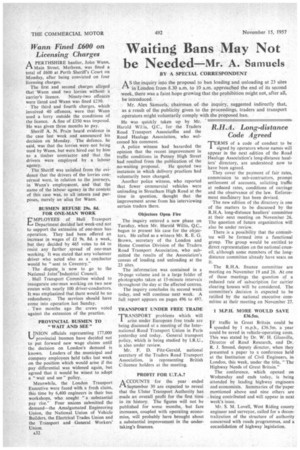Waiting Bans• May Not
Page 34

If you've noticed an error in this article please click here to report it so we can fix it.
be Needed Mr. A. Samuels
BY A SPECIAL CORRESPONDENT
AS the inquiry into the proposal to ban loading and unloading at 23 sites in London from 8.30 a.m. to 10 a.m. approached the end of its second week, there was a faint hope growing that the prohibition might not, after all, be introduced.
Mr. Alex Samuels, chairman of the inquiry, suggested indirectly that, as a result of the publicity given to the proceedings, traders and transport operators might voluntarily comply with the proposed ban.
He was quickly taken up by Mr. Harold Wil:is, Q.C., for the Traders Road Transport Associatrbn and the Road Haulage Association, who welcomed his comment.
A police witness had hazarded the opinion that the recent improvement in traffic conditions in Putney High Street had resulted from the publication of the no-waiting proposal. He quoted two instances in which delivery practices had voluntarily been changed.
Another police witness, who reported that fewer commercial vehicles were unloading in Streatham High Road at the time in question, thought that the improvement arose from his interviewing certain traders there.
Objectors Open Fire The inquiry entered a new phase on Tuesday, when Mr. Harold Willis, Q.C., began to present his case for the objectors. He called as a witness Mr. R. E. G. Brown, secretary of the London and Home Counties Division of the Traders Road Transport Association, who submitted the results of the Association's census of loading and unloading at the 23 sites.
The information was contained in a 70-page volume and in a large folder of photographs taken at I5-minute intervals throughout the day at the affected centres.
The inquiry concludes its second week today, and will continue next week. A full report appears on pages 496 to 497.
TRANSPORT UNDER FREE TRADE
TRANSPORT problems which will arise under European free trade are being discussed at a meeting of the International Road Transport Union in Paris yesterday and today. General transport policy, which is being studied by I.R.U., is also under review.
Mr. F. D. Fitz-Gerald, national secretary of the Traders Road Transport Association, is representing British C-licence holders at the meeting.
PROFIT FOR U.T.A.?
A CCOUNTS for the year ended ri•September 30 are expected to reveal that the Ulster Transport Authority has made an overall profit for the first time in its history. The figures will not be published for some months, but fare increases, coupled with operating economies, will probably have brought about a substantial improvement in the undertaking's finances.
R.H.A. Long-distance Code Agreed
TERMS of a code of conduct to be I signed by operators whose names will appear in the next edition of the Road Haulage Association's long-distance hauliers' directory, are understood now to have been agreed.
They cover the payment of fair rates, commission to sub-contractors, prompt settlement of accounts, soliciting traffic at reduced rates, conditions of carriage and the observance of the law. Enforcement machinery has been devised.
The new edition of the directory is one of the matters to be discussed by the R.H.A. long-distance hauliers' committee at their next meeting on November 26. The question of future organization will also be under review.
There is a possibility that the committee will be formed into a functional group. The group would be entitled to direct representation on the national council, although some members of the longdistance committee already have seats on it.
The R.H.A. finance committee are meeting on November 19 and 26. At one of these meetings the question of a reduced rate of subscription for carrier clearing houses will be considered. The committee's decision is expected to be ratified by the national executive committee at their meeting on November 27.
1 M.P.H. MORE WOULD SAVE £36.5m.
IF traffic in Great Britain could be speeded by 1 m.p.h., £36.5m. a year could be saved in vehicle-operating costs. This was stated by Dr. W. H. Glanville. Director of Road Research, and Dr. R. I. Smeed, deputy director, when they presented a paper to a conference held at the Institution of Civil Engineers, in London, this week, under the title, "The Highway Needs of Great Britain."
The conference, which opened on Wednesday and ends today, is being attended by leading highway e9ineers and economists. Summaries of the paper mentioned above and nine others are being contributed and will appear in next week's issue.
Mr. S. M. Lovell, West Riding county engineer and surveyor, called for a decentralization of the structure of authority concerned with roads programmes, and a consolidation of highway legislation,








































































































